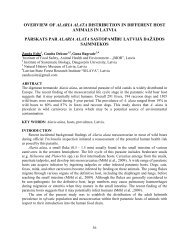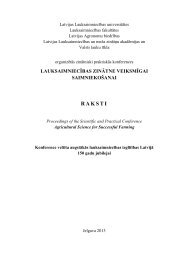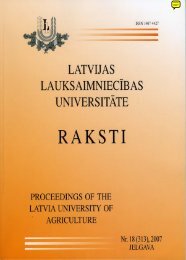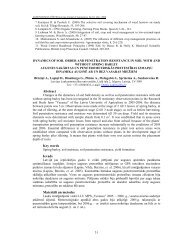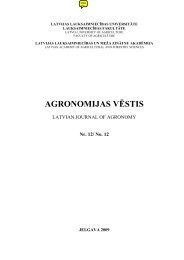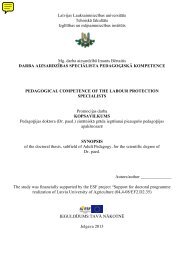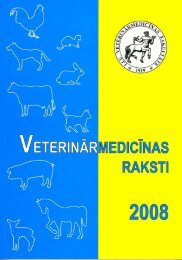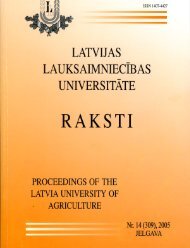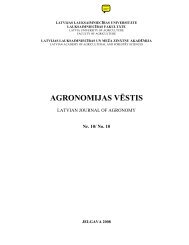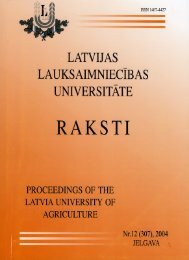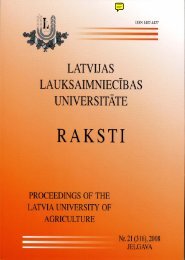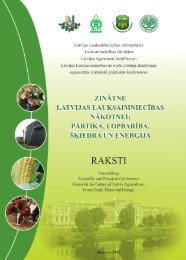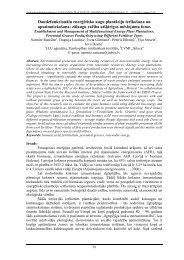Latvia University of Agriculture - Latvijas Lauksaimniecības ...
Latvia University of Agriculture - Latvijas Lauksaimniecības ...
Latvia University of Agriculture - Latvijas Lauksaimniecības ...
You also want an ePaper? Increase the reach of your titles
YUMPU automatically turns print PDFs into web optimized ePapers that Google loves.
K. Vārtukapteinis Agricultural Engineering and Pedagogical Sciences at the Faculty <strong>of</strong> EngineeringHistory <strong>of</strong> Education, Science and MachineryAt the Faculty, also research in the field <strong>of</strong> the history <strong>of</strong> education, science andmachinery is carried out (K. Vārtukapteinis, J. Ozols, A. Čukure, J. Tupiņš). The researchresults are presented in 21 presentations at international scientific conferences, 6 articlesin international scientific issues, 17 scientific issues in <strong>Latvia</strong>, and 87 other publications,including 14 monographs.Pedagogical Environment ResearchResearch in the field <strong>of</strong> pedagogics at the Faculty started already in the 1960s. Thefirst dissertation in pedagogical sciences was defended already in 1967 by J. Blīvis, ateacher <strong>of</strong> the Department <strong>of</strong> Tractors and Automobiles (Бливис, 1967).The research in pedagogical science is concentrated at the Institute <strong>of</strong> Education andHome Economics and is carried out mainly in countryside environment or in organizationsrelated to rural areas. The selection <strong>of</strong> the themes, aims and tasks <strong>of</strong> the research isdetermined by the necessity to solve education problems in regions. The research iscarried out in the sub-branches <strong>of</strong> comprehensive schools, higher schools, and adultand branch pedagogics in five research trends: ecology <strong>of</strong> education, competence inrural environment, pr<strong>of</strong>essional and career education, life quality in the context <strong>of</strong>home environment, and natural and engineering didactics. Pedagogical environmentresearch was started in the 1990s and is still continued (A. Aizsila, I. Apsīte, R. Baltušīte,B. Briede, I. Katane, L. Pēks, T. Sēja (1955-2009), etc.). Long-term pedagogicalexperience <strong>of</strong> researchers and achievements <strong>of</strong> the graduates from the Faculty <strong>of</strong>Agricultural Mechanization at work have been evaluated. It has been stated that it isstrongly influenced by the social environment <strong>of</strong> studies and the formal education obtainedin it. The statements were theoretically substantiated and experimentally tested thatessential characteristics <strong>of</strong> pedagogical environment are multifamily, activities friendly tothe participants <strong>of</strong> studies and possibilities to manage their emotional conditions. Underthe influence <strong>of</strong> human ecological theories and conceptions, education ecology researchwas continued and it transformed and extended through formation and development<strong>of</strong> the branch <strong>of</strong> educational ecology. In the result <strong>of</strong> the research, the philosophicalmethodologicalbasis <strong>of</strong> education ecology was developed and the role <strong>of</strong> educationecology among the many sub-trends <strong>of</strong> human ecology was substantiated. Recentlywork at development <strong>of</strong> the conceptual substantiation <strong>of</strong> ecology education is continuing.The research characterizes the multiformity <strong>of</strong> the educational paradigm today, whichshows the changing processes in society, development <strong>of</strong> science and pluralism in thedemocratic educational environment. Scientific substantiation <strong>of</strong> the ecological paradigmin education and complementarity <strong>of</strong> conceptual approaches has been given. The systemapproach in development <strong>of</strong> environmental models has been substantiated respectingthe structural, functional and evolutionary aspects <strong>of</strong> environment, and the basicprinciples <strong>of</strong> ecological approach in education have been formulated and substantiated.The research has resulted in a promotion work (Katane, 2005). The research resultsare reflected in 54 presentations at scientific international conferences, 62 articles ininternational scientific issues, 5 scientific issues in <strong>Latvia</strong>, and 38 other publications,including 4 monographs. In the future dissertation <strong>of</strong> R. Baltušīte “Development <strong>of</strong> futureteacher readiness for pr<strong>of</strong>essional activities in school education environment” researchis carried out in scientific substantiation <strong>of</strong> the notion “readiness for pr<strong>of</strong>essionalactivities” and techniques <strong>of</strong> diagnostics as well as in development <strong>of</strong> the model <strong>of</strong>future teacher pedagogical internship at school. In the doctoral dissertation <strong>of</strong> I. Kalniņa“Development <strong>of</strong> secondary school student competitiveness in the process <strong>of</strong> non-formalcareer commercial education at country school”, research is carried out in the scientificsubstantiation <strong>of</strong> the notions “personal competitiveness” and “competitive specialist”,development <strong>of</strong> techniques <strong>of</strong> diagnostics and indicator systems as well as in elaboration<strong>of</strong> non-formal commercial education didactic model in the context <strong>of</strong> career educationat school. In the doctoral dissertation <strong>of</strong> D. Penke “Pr<strong>of</strong>essional self-determination <strong>of</strong>countryside students in the process <strong>of</strong> elementary school career education”, a careereducation model at country school has been developed, and work is carried on atperiodisation <strong>of</strong> human pr<strong>of</strong>essional formation and development, scientific substantiation<strong>of</strong> personal pr<strong>of</strong>essional self-determination and its diagnostics. The scientific and practicalcontribution <strong>of</strong> the research in education quality <strong>of</strong> future teachers is substantiatedin the future dissertation <strong>of</strong> I. Apsīte “Development <strong>of</strong> reflection in teacher educationat higher school”.42 <strong>Latvia</strong> <strong>University</strong> <strong>of</strong> <strong>Agriculture</strong> – 70, 2009



